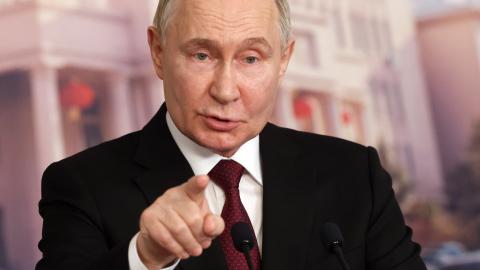Marshall Billingslea spoke to Cristina Maza recently on the sidelines of the annual Lennart Meri Conference in Estonia about whether U.S. sanctions on Russia are working and how he believes former President Trump would approach the war in Ukraine if he wins reelection. This interview has been edited for length and clarity.
Are U.S. sanctions against Russia working? What impact are sanctions having on Russia’s ability to wage war?
The sanctions are not working—or, to be more precise, they are not working fast enough.
But it's very important to differentiate between what I just said and the Kremlin's narrative, which is that sanctions don't work. That is not true. Sanctions can work. They do work. We've seen them work in the context of Iran and Venezuela under the Trump administration. But they only work if you abide by a few key principles.
The first is that sanctions are never a substitute for strategy. You have to have a strategy into which the sanctions fit. One of our problems is that neither the United States nor any of the senior leaders of the larger European countries have articulated the strategy for Ukraine. Indeed, that's why the Republicans in the supplemental bill for funding require the president to submit a real strategy.
Secondly, sanctions only really have meaning if they are targeted against people or things connected to the international financial system. Otherwise, they're symbolic. You'll hear the Treasury [Department] say we sanctioned 300 entities here or we did this. Quite a few of those are symbolic. It looks good. It pads the stats. But in reality, you have to go after people who need to transact across the financial system or have property or other things outside of Russia.
Thirdly, sanctions have to be comprehensive. They can't be riddled with loopholes. One of the reasons why President Trump's sanctions against Iran were so effective is that we went after all of the Iranian banks. We went after all Iranian oil exports. In the case of Russia, very explicitly, neither the United States nor the European Union has been willing to go after all Russian banks. And even when they went after the big banks, the Biden administration issued effectively a waiver. It's called a general license that says, notwithstanding the sanctions on these big Russian banks, if it's energy trade, it's fine. The oil-price cap adopted by the G-7 and the EU is another example of something riddled with loopholes. The price cap itself was artificially high. It's unenforceable and hasn't had a real material effect on Russian oil sales.
So today and every day, Russia brings in between 800 and 900 million euros in revenue per day, depending on whose numbers you believe. And that money is going right back into the war effort.
Finally, I would say sanctions have to be enforced. You can't just throw them out there and then do nothing. You have to actively pursue evasion violations in our legal system. In the U.S., a sanction is itself a civil penalty. But evasion of a sanction is a felony, and the Department of Justice prosecutes it. Before the war, European countries did negligible business with Kazakhstan and Kyrgyzstan. We've seen a massive spike in commodity sales to these countries. And of course, it's not because the demand for microwaves just suddenly quintupled. It’s because all this stuff is going to Russia. They're pulling it apart, taking those components, and putting them into cruise missiles and drones and other things. So the policing of the sanctions and the export controls has been lacking.
What more should the Biden administration do?
It really, really, really comes down to China. Secretary of State [Antony] Blinken was in China. He made it crystal clear to the Chinese that patience was running thin concerning what they were doing to allow stuff to flow to the Russian war machine. But as of yet, we haven't seen the Biden administration really go after any of the Chinese banks intermediating these transfers to Russia.
And this is another key aspect of what it takes to make a sanctions regime work. You have to have secondary sanctions. The Biden administration has only allowed one narrow type of secondary sanction for Russia: sanctions on non-Russian financial institutions that facilitate trade with Russian defense and aerospace companies.
If you watch the travel patterns of senior U.S. Treasury [Department] officials and some State [Department] people, you will see repeated trips to Turkey, the United Arab Emirates, and China. Sanctions have been imposed on these intermediaries, middlemen, and brokers, and that's good. But we probably should be seeing a lot more of it.
You mentioned sanctions against Venezuela and Iran during the Trump administration. What evidence is there that these sanctions changed these countries' behavior?
We have clear evidence in their own words.
The Iranian sanctions really brought the economy to its knees only after about a year and a half under President Trump. He withdrew from the JCPOA [the Iran nuclear deal] after about a year and a half in office, and then we started the sanctions. We immediately saw a number of things happen.
So we saw the Quds Force—the main conduit by which the Iranian regime passes money to terror groups—begin to engage in elaborate fundraising schemes that they had not had to do when they were flush with cash. For example, we saw the Quds Force commandeer oil tankers from the National Iranian Oil Company and the NITC, the tanker corporation, and began to smuggle oil, in cahoots with Hezbollah, to Syria as a way of trying to raise money.
[Hassan] Nasrallah, the head of Hezbollah himself, talked about the war Treasury was waging on him. And he actually began running telethons in Lebanon to solicit donations because he was hurting, because the Iranian regime wasn't able to furnish him with the 800 or 600—whoever's number you believe—close to a billion dollars a year in revenue.
And so, what Hezbollah was having to do was make some tough choices about whether they prioritized martyr payments for the guys who ran out and got themselves killed in Syria—so payments to those families—that meant they had to cut back on free hospital services for the rank-and-file guys in Lebanon. We saw Hezbollah start to get into the drug trade as a way of making ends meet. We saw them start to press the diaspora community for donations and money.
How could the U.S. now more effectively prevent Russia from using its relationships with countries like Iran and North Korea to wage the war in Ukraine?
There is this whole network of countries that are seeking to topple the U.S.-led world order that was established with our friends and our allies after World War II. They're all in collusion. I don't have much hope for the Biden administration being able to solve this issue because they've been unwilling so far. But perhaps in a few months, there would be a different administration.
We still have all the necessary sanctions on Iran and Venezuela, so you begin enforcing those sanctions. You then go back to the Indian and Chinese refineries and explain to them that, "There will be consequences if you guys buy this stuff." I am extremely pleased that Speaker Johnson was able to advance the bill to provide the supplemental funding [for Ukraine], and that he did so with President Trump's support because we converted the grant concept to a loan.
Now the desperately needed military capabilities are starting to flow. But continuing to do half measures, by restricting the Ukrainians in terms of when, where, and how they can use these weapons, by telling the Ukrainians that they cannot or should not be striking Russian oil refineries, and so on and so forth—these are handcuffs that should not be put on the Ukrainians to defend themselves.
Former President Trump has said he would end the war in Ukraine within 24 hours. Some people have interpreted that as saying he would hand Ukrainian territory to Russia. What would Trump's approach be if he were to win the election?
He has said he'd bring it to a speedy conclusion, but he's never said he's simply going to cough up Ukrainian territory. Many, including myself, have criticized the Biden administration for not being able or comfortable using leverage, particularly against the Russians.
I was President Trump's special envoy for negotiating the New START Treaty with the Russians. We left the Biden administration with a very strong hand to play, because we had told the Russians that we were not going to simply give them an unconditional five-year extension of that treaty. We were going to get concessions in exchange for a year-by-year extension. So what does the Biden administration do on the first or second day of office? They come in, they say, “No, we're not going to get concessions. We're going to simply extend it for five years.”
That showed all of us from Day One that this administration doesn't understand leverage. President Trump understands leverage. He's a savvy businessman. He has written about leverage and how to find, gain, and use it.
And I have every expectation that he will identify the leverage necessary to get a good deal with the Ukrainians versus Russia. In my way of thinking, the leverage is most readily obtained by putting crippling economic pressure on Putin to make clear to him that he cannot continue to fund the war machine.




















